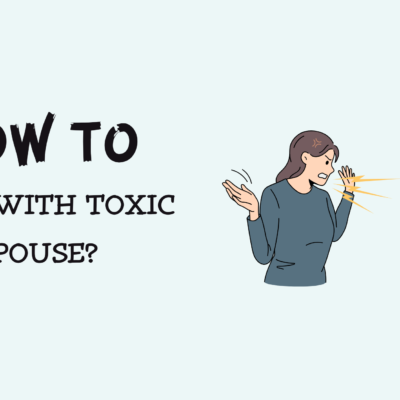How to Deal with a Toxic Spouse: Being in a relationship should bring love, support, and happiness, but when your spouse exhibits toxic behaviors, it can leave you feeling drained, unappreciated, and emotionally exhausted. A toxic spouse can manipulate, control, criticize, or emotionally harm their partner, creating a negative and unhealthy environment.
If you’re in a marriage with a toxic partner, it’s crucial to recognize the signs, set boundaries, and protect your mental and emotional well-being. This article will guide you on how to deal with a toxic spouse, regain your strength, and make informed decisions about your relationship.
Also Read:
- How to End a Trauma Bond Relationship?
- How to Get over Someone that You See Everyday?
- How to Stop Worrying about Cheating?
Understanding Toxic Behavior in a Marriage
Toxic behavior in a relationship can come in many forms, from emotional and verbal abuse to manipulation and neglect. Some common signs of a toxic spouse include:
1. Constant Criticism & Blame
- They frequently put you down, belittle your efforts, or make you feel like you’re never good enough.
- They blame you for everything that goes wrong, even when it’s not your fault.
2. Manipulation & Control
- They try to control your actions, friendships, finances, or decisions.
- They use guilt, silent treatment, or emotional blackmail to get their way.
3. Lack of Respect
- They dismiss your feelings, opinions, or personal boundaries.
- They don’t respect your time, efforts, or needs.
4. Emotional Neglect & Indifference
- They are emotionally unavailable and dismissive of your needs.
- They don’t show affection, empathy, or interest in your well-being.
5. Verbal or Emotional Abuse
- They yell, insult, or humiliate you in public or private.
- They gaslight you—making you doubt your reality and feel like you’re always in the wrong.
If these behaviors are present in your marriage, it’s important to acknowledge them rather than ignore or justify them.
How to Deal with a Toxic Spouse
1. Acknowledge the Toxicity Without Self-Blame
One of the hardest parts of being in a toxic relationship is realizing that your spouse’s behavior is not your fault. Many people in toxic marriages blame themselves, thinking, “Maybe I’m not trying hard enough,” or “If I change, they’ll treat me better.”
The truth is:
- Toxic people choose their behavior. Their actions are not your responsibility.
- You cannot “fix” a toxic partner—they have to recognize and change their behavior themselves.
- You deserve respect, love, and emotional safety.
Recognizing this can help you stop internalizing blame and start focusing on protecting yourself.
2. Set Firm Boundaries
A toxic spouse often pushes boundaries, testing how much control they can exert. Setting clear, non-negotiable boundaries is essential.
How to set boundaries:
- Be direct and assertive – Example: “I will not tolerate yelling or name-calling in arguments.”
- Stick to your limits – If they violate a boundary, follow through with consequences (e.g., leaving the room, reducing interactions).
- Protect your mental and emotional space – Avoid engaging in toxic fights or manipulation.
Boundaries won’t change your spouse’s behavior, but they will help protect your well-being.
3. Limit Engagement in Toxic Arguments
A toxic spouse often thrives on conflict and emotional reactions. They may twist your words, bring up unrelated issues, or gaslight you into doubting yourself.
To avoid getting drawn into toxic arguments:
- Stay calm and composed – Don’t give them the emotional reaction they seek.
- Use short, firm responses – Instead of arguing, say, “I will not discuss this if you continue to yell.”
- Walk away when needed – You don’t have to engage in every fight.
Choosing your battles wisely can reduce stress and emotional exhaustion.
4. Focus on Self-Care and Emotional Healing
A toxic relationship can drain your self-worth, confidence, and happiness. Prioritizing self-care is essential to regain your emotional strength.
Ways to focus on yourself:
- Engage in hobbies and interests that make you happy.
- Maintain friendships and support networks.
- Practice self-love and positive affirmations.
- Exercise, meditate, or engage in activities that reduce stress.
When you invest in yourself, you regain power and confidence, making it harder for a toxic spouse to control or manipulate you.
5. Seek Outside Support (Friends, Family, Therapy)
Dealing with a toxic spouse alone can be overwhelming. Reaching out for support can provide clarity and emotional strength.
Who to turn to:
- Trusted friends or family members – Talk to those who truly care about your well-being.
- Therapist or counselor – Professional guidance can help you understand your emotions and develop coping strategies.
- Support groups – Connecting with others who have faced similar experiences can be healing.
Seeking support is not a sign of weakness—it’s a step toward regaining control of your life.
6. Evaluate Whether the Relationship is Salvageable
Not every toxic marriage is doomed—some relationships can improve with therapy, mutual effort, and accountability. However, this is only possible if:
- Your spouse acknowledges their toxic behavior.
- They actively work to change their actions.
- Both of you are willing to rebuild trust and respect.
If they deny their behavior, refuse to change, or continue hurting you, then staying in the relationship may not be the healthiest choice.
7. Consider an Exit Plan If Needed
If your spouse’s behavior is emotionally, mentally, or physically harming you, it may be time to consider leaving the relationship.
Steps to prepare an exit plan:
- Gather financial and legal information.
- Secure a safe place to go if needed.
- Seek legal advice if you’re considering divorce or separation.
- Have a support system ready.
Leaving a toxic spouse is not easy, but staying in an emotionally damaging relationship can harm your mental and physical health in the long run.
Final Thoughts
Dealing with a toxic spouse is challenging and emotionally exhausting, but it’s important to remember that you are not powerless. By setting boundaries, prioritizing self-care, seeking support, and making informed choices, you can regain control, confidence, and peace of mind.
If your spouse refuses to change or continues their toxic behavior, don’t hesitate to prioritize your safety, happiness, and future. A healthy relationship should uplift and support you—not tear you down.








